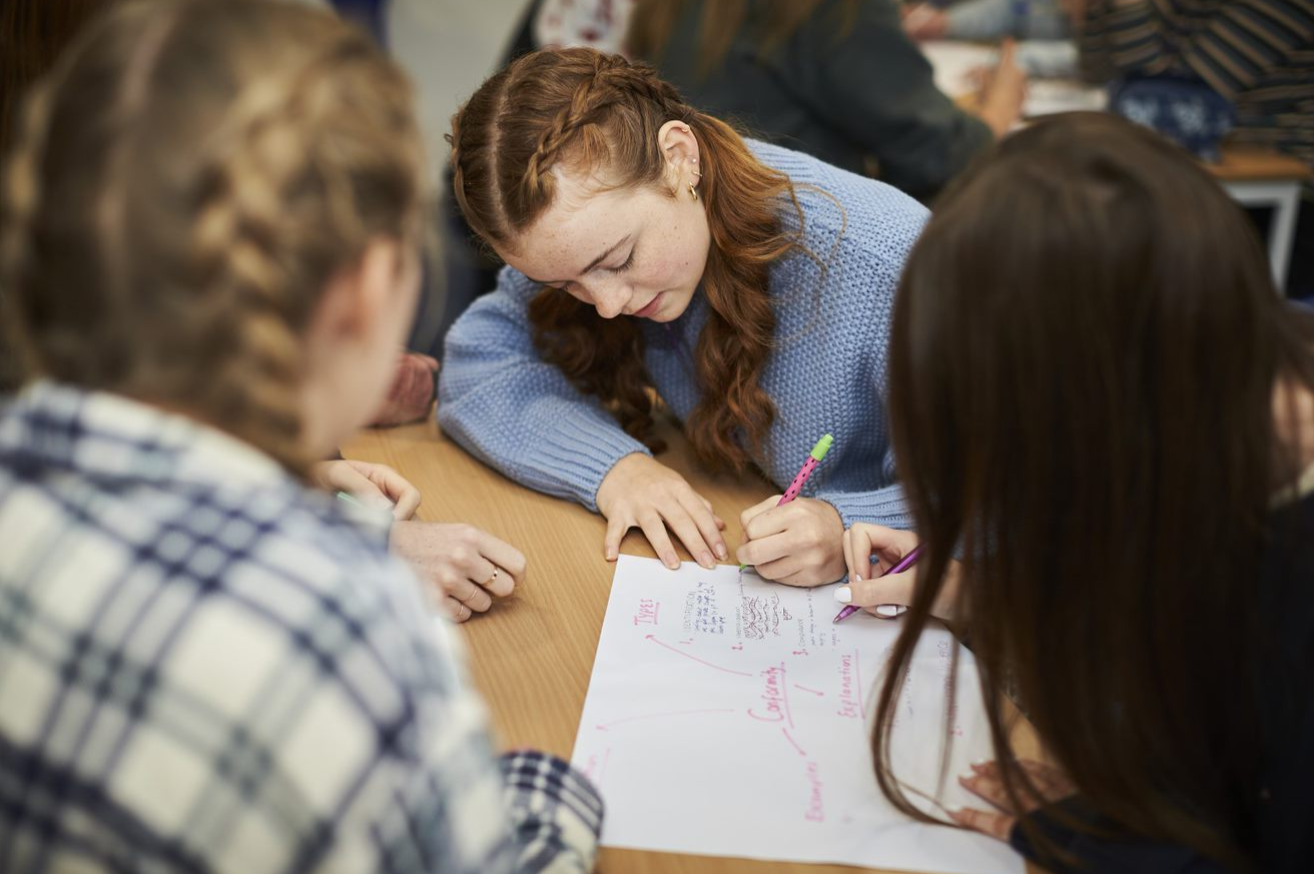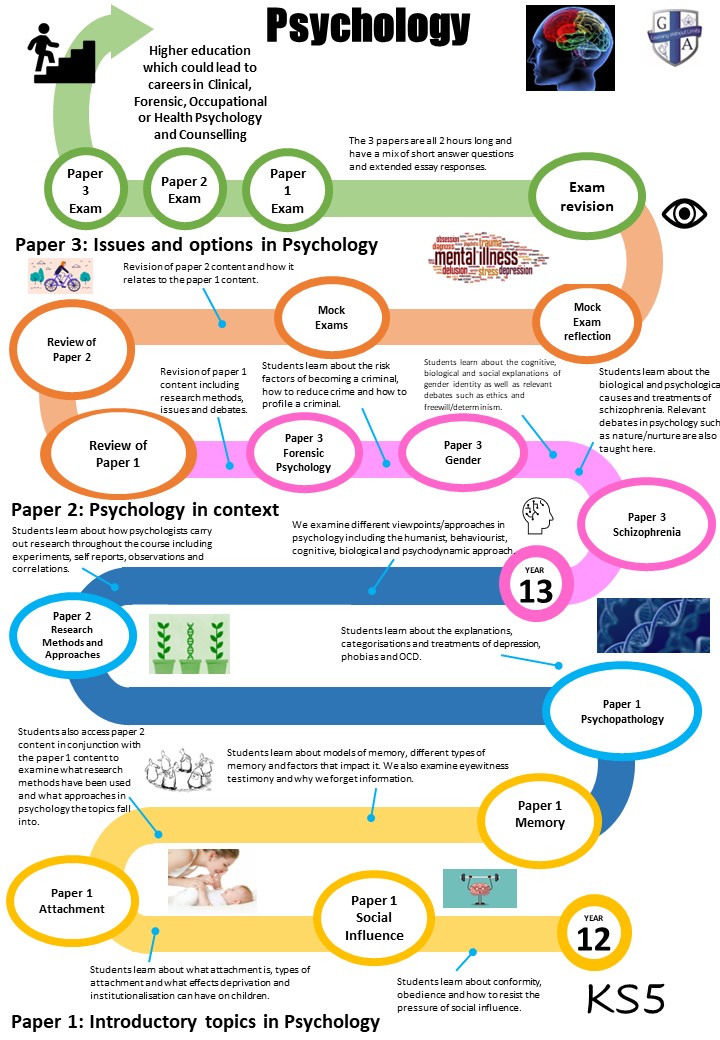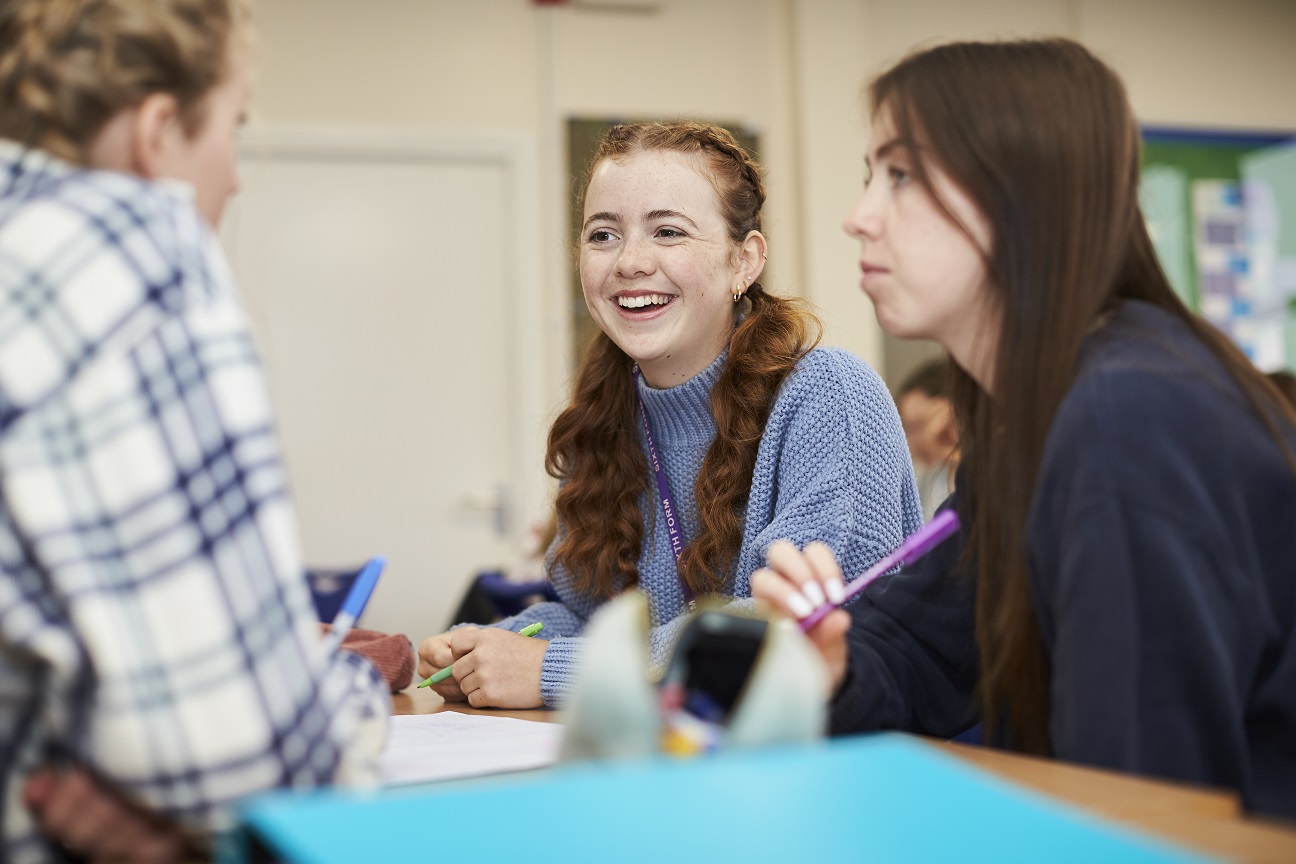Psychology
Psychology is around us all the time! A level psychology gives student’s an insight into the human mind and behaviour by studying topics such as social influence, memory, psychopathology and attachment. We also learn about how to carry out research in psychology making it a subject which develops many transferable skills in students such as scientific and statistical analysis, essay writing and critical thinking skills.
Our Curriculum
A level Psychology is a broad and varied subject which looks at topics such as social influence, memory, attachment, psychopathology, and biopsychology. It also develops student’s research skills as we carry out and analyse our own experiments, as well as develops an appreciation of other people and factors that impact their behaviour.


"The greatest discovery of my generation is that human beings can alter their lives by altering their attitudes of mind." — William James
The Framework of our intent
The aim of the Psychology curriculum is to equip students with the appropriate knowledge and skills needed to be able to understand and the explanations of human behaviour and the impact of this behaviour on wider society.
How will we reach these aims?
We do this using quality first teaching which ensures students understand underlying Psychological principles and can apply them in a variety of familiar and unfamiliar contexts.
We enable students to be able to think analytically and reach logical conclusions based on scientific evidence.
Our curriculum in Psychology supports the ethos statements of the school. Students are constantly challenged to work collaboratively and think independently when engaging in all lessons and class debates. Through teacher modelling, we encourage our students to demonstrate manners, respect and tolerance in Psychology lessons. This allows students to express themselves in a confident manner.
Lesson materials are engaging to promote topical discussion and encourage students to develop an enquiring mind.
As a knowledge based curriculum we believe that knowledge underpins and enables the application of skills; both are entwined. Content is delivered to students and then built upon through a variety of practice questions, with regular quality feedback being given to support student progress. The knowledge acquired then allows students to develop their analytical and critical thinking skills.
Our students are introduced to a wide variety of viewpoints from some of the most influential Psychology throughout history. We study the impact that their work has had on the world we live in and students are encouraged to make links between their studies and real life examples. They are expected to analyse the relative contributions of competing theories in order to discuss their impact on our understanding of human behaviour and society as a whole. In addition to our aims, our curriculum design includes revisiting and building on existing knowledge. We ensure the level of challenge is high enough for the most able, with scaffold and support available for students who need it.
|
Guilsborough Academy Vision |
How we embed this |
|
We aspire to be our best and to do our best for others
|
As a team of teachers who work hard to engage our learners. We work together and constant learn from each other. |
|
We respect ourselves and others
|
Learning about other cultures and theorists. Our discussions allow students to be open and have an understanding of each other. |
|
Our learning knows no limits
|
Like the quote above we learn from others and change out attitudes though learning. |
|
We are global citizens ready for the 21st Century
|
Learning about issues in psychology and how we can approach them in a well rounded ethical manor. |
Content
PAPER 1 (2 hrs, 33.3%)
Memory
Including models of memory, explanations for forgetting, and the accuracy of eyewitness testimony.
Attachment
Including early social development, cultural variations and explanations of attachment, and the effects of deprivation on later relationships.
Social Influence
Including conformity, obedience to authority and independent behaviour.
Psychopathology
Including definitions of abnormality, characteristics of phobias, depression and OCD, and approaches to explaining abnormality and therapies.
PAPER 2 (2 hrs, 33.3%)
Approaches to Psychology
Including psychodynamic, cognitive, behaviourist, evolutionary and biological approaches to studying behaviour.
Biopsychology
Including the divisions of the nervous system, the structure and function of neurons and of the endocrine system, and the role of adrenaline.
Research Methods
Understanding the research procedures used in psychological research (design, procedure, analysis of results, evaluation).
PAPER 3 (2 hrs, 33.3%)
Issues and debates
Including cultural and gender issues, the nature/nurture debate, and debate between determinism and free will.
Option 1 [one topic from]
Relationships, Gender or Cognition and development
Option 2 [one topic from]
Schizophrenia, Eating behaviour or Stress
Option 3 [one topic from]
Aggression, Forensic psychology or Addiction
Entry Requirements
Please see the entry requirements document here
Is This Course Right For Me?
Firstly, you need to be interested in people. You should be willing to participate, to share your ideas and interpretations and to listen to others. As the course involves a great deal of written work (essays, reports and lots of note-taking), the ability to write coherently and accurately is a vital skills to develop. You will need to be willing to put in effort and commitment as Psychology is a very demanding A Level! You will need to have critical thinking skills and not always take things on face value as you need to be able to evaluate topics and studies in terms of strengths and weaknesses. To be successful at A level Psychology, you need to complete a lot of work outside of lessons including homework, research tasks, presentations, and revision of the lesson content.

Please watch our short video to see what studying Psychology at Guilsborough Sixth Form is like.
I love the debates we have in psychology; they are always fun!
Francesca, Year 12 student
It is a new, interesting and varied subject to learn
Grace, Year 12 student
It is always interesting and never repetitive. We are always learning something new
Molly, Year 12 student
Where will A Level Psychology take me past Sixth Form?
CAREERS
The great thing about Psychology is that it doesn’t close any doors. An A Level in Psychology can be the first step into a career in Psychology such as clinical, forensic, educational, occupational, sports, health, or environmental psychology, as well as teaching or research. Psychology is a highly regarded qualification by higher education institutions and employers alike; especially in fields that are ‘people-oriented’ – such as marketing, HR, policing, teaching, PR, nursing, counselling, or social work. The list is endless!
Please visit out Careers Guidance page for more information
UNIVERSITY
Some examples of universities and their entry requirements to study Psychology and other related degrees are;
University of Bath Bsc (Hons) Psychology requires A*AA
University of Kent Bsc (Hons) Applied psychology with placement (4 yrs) requires AAA
Goldsmiths, University of London Bsc (Hons) Clinical Psychology requires AAB-ABB
University of Northampton Bsc (Hons) Developmental and Educational Psychology requires BBC.
Manchester Metropolitan University Bsc (Hons) Forensic Psychology requires BBB-BBC.

